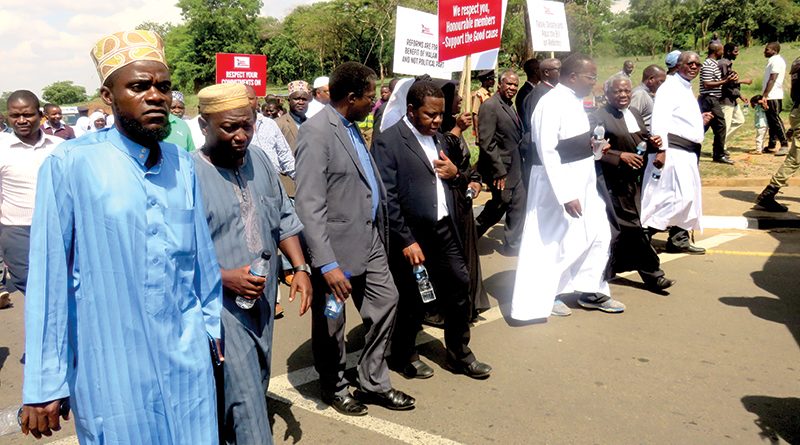WHEN ARE CHECKS AND BALANCES ACCEPTABLE?
By Joseph Kayira
There are over at this blog two kinds of verbs when they’re utilized to link the topic and the main idea of the essay.
In 2014, to be precise, on June 1, the Public Affairs Committee (PAC), released press statement congratulating President Peter Mutharika for his triumph in the disputed General Elections a month before.
President Mutharika had won with a simple majority. For days on, the Malawi Electoral Commission (MEC) was bombarded with injunctions some retraining it from announcing results while others pressured it to announce the winner in the presidential poll.
The Malawi Congress Party (MCP) and the then ruling Peoples Party (PP) candidates intimated the election was stolen. MCP’s Dr Lazarus Chakwera and his followers said they had been robbed of their victory. President Joyce Banda demanded a rerun. She was told that she did not have the powers to call for a rerun.
There were violent scenes in some parts of the country. At least one person was killed in Mangochi. While announcing the results MEC chairperson, Justice Maxon Mbendera shed tears. He said the death of the boy who was killed in Mangochi was unnecessary.
Mutharika was the winner. The MCP said the rightful winner was Chakwera. The relationship between Mutharika and Chakwera has been tense. A few days ago at a function in Lilongwe they greeted each other. Before that, they have been avoiding each other and took their battle to the political podium.
PAC said it realized that the race (presidential) was tight and that “the results themselves demanded that all political parties work together towards a common good.”
“PAC would like to ask Malawians to work together but at the same time to provide checks and balances for democracy to be sustained. Elections are just element of democracy, and therefore as stakeholders and institutions we will be expected to play our role in the developmental process especially in checking the excess powers of the Office of the President,” read in part the June 2014 statement.
PAC added that it would commit itself to contributing to the efforts of other stakeholders to ensure that democratic values and the rule of law are upheld “as we have always done.”
Perhaps the one thing that those who are currently fighting PAC need to be reminded is the fact that PAC had promised to monitor pledges made by parties through its presidential interface meetings in particular the implementation of constitutional review; reforms on statues that impinge on democratic governance; and respecting and dealing with issues of Section 65, which remain destabilizing factors in the country’s democratic terrain.
PAC hit the nail on the head on electoral reforms as well: “Following challenges in the electoral process it has become more than necessary for this country to immediately focus on legal reforms as a prerequisite to the building of our democracy and the rule of law.”
Apparently, there is nothing new with PAC’s stand on electoral reforms. It is obvious that those that are dressing down PAC, castigating its leadership and discrediting the quasi-religious body have forgotten about the 2014 press statement. But for those that have followed PAC since its inception in the 1990s, there is nothing strange about the organization’s stand on electoral reforms and other pertinent issues that have rocked Malawi.
The 2014 chaotic elections only helped PAC in its zeal to push for a quick, yet consultative and credible electoral reform process. In fact those in power promised to push for these reforms. The change of heart is even surprising some of the ruling party diehards.
Proponents of the 50%+1 proposal do not want a repeat of the 2014 elections when they unnecessarily waited for days to know the winner of the presidential race. Should the new law come into force, they would wait a little longer – this time round for 30 days – before a president-elect is sworn in. This would give time for MEC and other stakeholders to iron out any differences, address issues to do with irregularities and all matters arising from the elections.
On the other hand, those who are spending sleepless nights to defeat the 50%+1 system say there has been no time to civic-educate the electorate on the proposed electoral reforms.
Chiefs are among the people who have access to the national broadcaster Malawi Broadcasting Corporation (MBC radio and television). In their wisdom, the 50%+1 system will only confuse voters.
Until last minute, PAC garnered a lot of support for the demonstrations to force government to table the bills. However on 12 December the demonstrations were called off on the hope and understanding that government would table he reforms in Parliament.
But there was a new twist to the whole debacle. While the Special Law Commission recommended the introduction of 50%+1 system of electing the country’s president and maintaining the First-Past-The-Post system for members of Parliament and councillors, government has extended it to members of Parliament and councillors as well.
Would the 50%+1 system help Malawians to elect good leaders – better than the current crop of leaders? Is 50%+1 system more representative? Is it indeed going to deal with issues of tribalism, nepotism or regionalism? Would this system go beyond all the problems associated with First-Past-The-Post system?
Whatever the case, Malawians must be encouraged to vote in 2019. They should be encouraged to elect good leaders – regardless of their political affiliation, tribe, colour or creed.
One analyst said the 50%+1 system should be taken with a pinch of salt as it has created chaos in other parts of the continent. The analyst says those behind the electoral reforms appear to have someone in mind they are targeting with the bills.
“Is there a perfect electoral system that works better for every country in the world?” asks the analyst.


20 thoughts on “WHEN ARE CHECKS AND BALANCES ACCEPTABLE?”